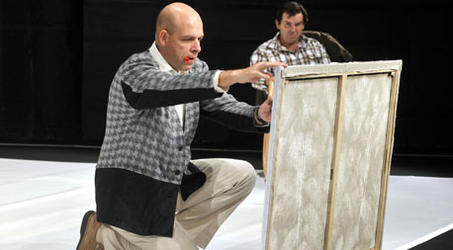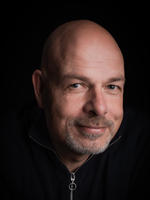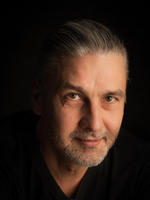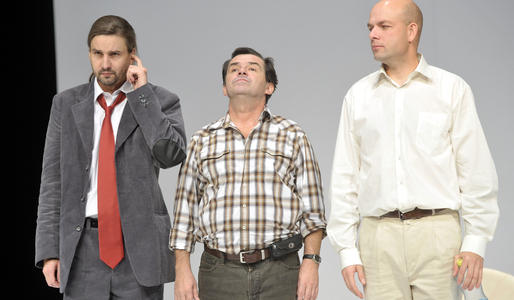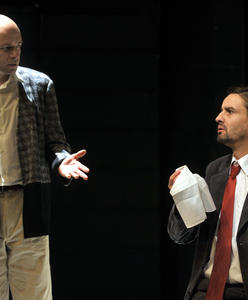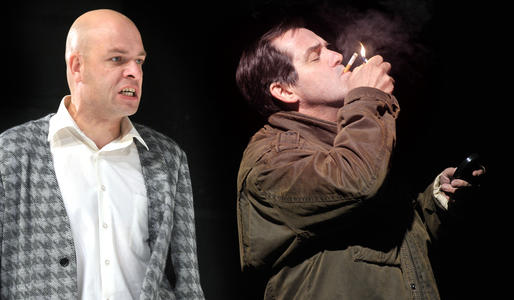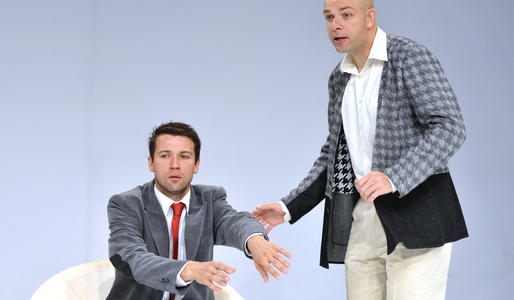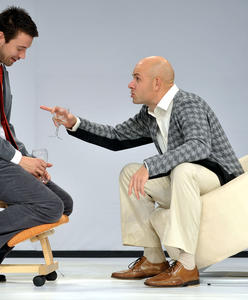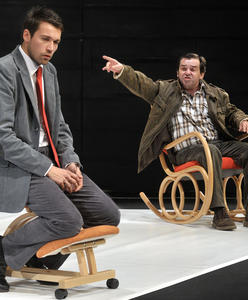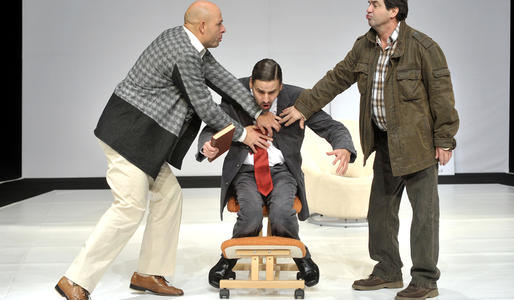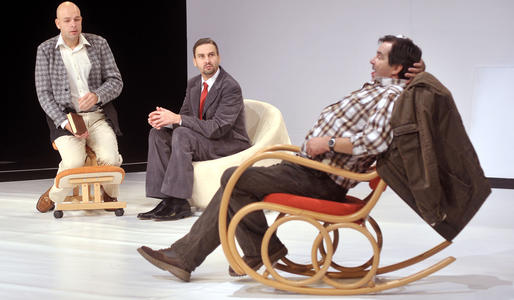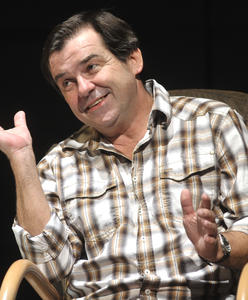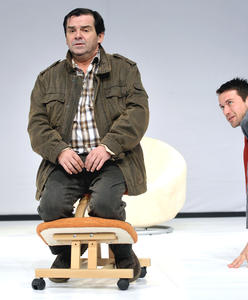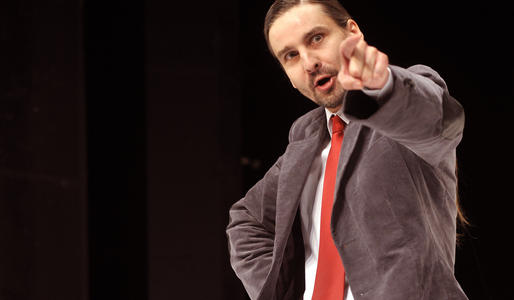Three friends and a white picture
Vít Závodský 1. January 2009 zdroj Kam-supplement no. 1
From the end of the last century the cosmopolitan Parisian of Jewish/Iranian/Hungarian origin Yasmina Reza, a scriptwriter and prose writer with acting and directorial training, has been the most popular French dramatist both in our country and worldwide.
The original, translated into around thirty-five languages, was converted into spoken Czech by Michal Lázňovský, is a work which is accessible to the audience, yet is more than a merely entertaining and shallow look at the world of men from the viewpoint of a cultivated and empathic woman. Three long-term friends, with different characters and from the middle classes - aeroplane engineer Erik (Erik Pardus), successful dentist Viktor (Viktor Skála) and the younger stationary seller Lukáš (Lukáš Hejlík), alt. Patrik (Patrik Bořecký) - go through and fortunately manage to overcome a huge difference of opinion caused immediately by the fact that Viktor has spent no mean sum of money on a picture by an acclaimed modernist, a picture which is more or less completely white (examples of similar artefacts can be found nicely presented in the traditionally well-produced programme by new dramaturge Klára Dvořáková).
Director Zdeněk Černín, known for his feeling for work with actors, was understandably aware that he wasn't presenting a text that was particularly new. Due to this, with his usual team (Jan Dušek's appropriately very minimalist set, containing elements common to all flats, with three pieces of modern furniture for sitting on, without changes of scenery and with the actors dressed in normal clothes, insistently simple music by David Rotter, and cooperative participants) he devoted proper, in places extremely precise care to this extremely well known text. He cut the original extremely 'chatty' play appropriately and while respecting its conversational character with a focus on the subtlety of precisely placed verbal elements he took opportunities whenever they arose to 'thicken the mixture', transforming the play in terms of action, gesture, mimicry, tempo and rhythm etc. The eighty minute non-stop evening was divided into short, swift, interrelated sequences. Not even in the spacious Drama Theatre was he afraid to include apparently static moments (laconic silences and pauses). Also quite successful was the replacement of the original names of characters with the real Christian names of the perhaps somewhat younger actors playing them. We don't have space here for a more detailed appreciation of the individual, non-caricaturing performances - Skála's intellectual, less snobbish character of choleric temperament, Pardus's foolish, mocking, ever-grimacing, self-contained clown or Bořecký and Hejlík's mediatory outsider of a somewhat different character. The discerning theatregoer will enjoy the many situational nuances, the pulsating mood, little embarrassments and the moments of truth and more serious Chekhovian motifs, opening into a catharsis that praises, without pathos, the boons of true, self-sacrificing, come-hell-or-high-water friendship.
The outwardly humble, yet appealingly meticulous production of Art is a stylishly harmonious piece which is balanced in all aspects.
Friendship, or a picture?
Iveta Macková 1. December 2008 zdroj Kult
Last October's premiere at Brno City Theatre was the performance of the comedy Art by Yasmina Reza on the Drama Stage. The almost one hour and a half long comedy (sometimes shown under the title The Picture) for three actors, translated by Michal Lázňovský, was produced by the director Zdeněk Černín who is, at the same time, the author of the adaptation.
The production takes place on the simple, non-changing set by the artist Jaroslav Dušek (who is also the author of the costumes), framed by a large white wall, somewhat backlit, on the horizon, with three mobile seating objects in the centre. These are next to the picture, which is the main conceptual as well as physical object of the play, and they are the only moveable elements on the otherwise large and empty stage.
The main and only characters in the comedy are long-time friends - men aged thirty-two, forty and fifty. Each of them is a bearer of a certain social and intellectual status which affects their behaviour, their ways of thinking and acting. Among other things, their clothing speaks about the type of person wearing it. An accompanying component of the production is David Rotter's functional music.
The plot of the comedy revolves around the somewhat financially demanding purchase of a modern picture by one of the friends, and it is the picture which is an impulse to the stirring up of their mutual relations. The text, or the contents of the comedy is not particularly demanding and the production stands and falls on the quality of the actors and their performances. Černín's conception even leaves the actors' own first names - Erik (Erik Pardus), Viktor (Viktor Skála) and Lukáš (Lukáš Hejlík).
In the premiere, this trio (Lukáš is alternated by Patrik Bořecký) succeeded in producing an almost "real" debate, not only about this picture, but also about interpersonal relations, their values, strength and importance, for which they were awarded applause by the happy audience.
A play about Art and experience gained from it
Peter Stoličný 13. November 2008 zdroj www.divadlo.sk
The play is written in a very simple way, directly, without frills and side effects. It comes straight to the point and it names things in a straightforward way. It is as if the author was hidden in an architecture studio on Gottwald Square in Bratislava and copied from us, friends, who were thinking and arguing about abstract pictures of Sašu Viku (white in white).
The play had its premiere under the name Art at the Drama Stage of Brno City Theatre in October 2008. By the way, the name Art says a lot more about the contents of the play and in a better way than the name The Picture (the name of the play in the original is L’Art). A performance for three actors, a sort of chamber play, private, it would be more suitable for a lot smaller stage, also a more private one. However, the director Zdeněk Černín cast a spell on the room and the relatively large stage as well as the auditorium obtained an unbelievable chamber-style atmosphere. I have already written somewhere that under Černín's direction, his original job as an actor can be sensed. His direction is always actor-oriented. It originates in his trust in the actor. No side effects or expressive ideas are needed in order for his productions to be interesting, and this causes the spectator to "wake up" from their lethargy. To sum up, it can be said that his direction is minimalist. Černín allows his characters to act out the story in a small room, with a simple set, with equal emphasis on words as well as on silence. The scene of the friends' first contact with the abstract paining is beautiful. They examine it cluelessly and silently. Silently and cluelessly.
In order that the trio had a closer relationship with each other, and had a relaxed and trustworthy effect on the spectators, the director changed the names of the characters to the first names of the actors. And thus the introvert owner of the image, Viktor Skála, is Viktor, his friend who easily gets into conflicts due to his cheekiness is Erik (played by Erik Pardus), and the youngest of the friends, a boy who has no particular opinion and who would like to suit everyone - and it is not possible - is Lukáš, performed, of course, by Lukáš Hejlík. Patrik Bořecký, who alternates the character, plays under the name Patrik on the stage as well. This personal approach perhaps also helped the actors to get a feel for the roles of the three friends, to play as if they were the real characters. This is also because both the dialogues and the silences of Yasmina Reza are exact, copied from life (or perhaps also from the department of architecture in Bratislava?). And really, many men can see themselves in this trio. And many people will say: I can't believe this - I have experienced this myself, or I am experiencing something similar.
There is no need to write about the acting talents of Erik Pardus and Viktor Skála. They never surprise with a bad performance because they are always excellent. This is really the hardest position. And the young one in the trio, Lukáš Hejlík, surprised in a pleasant way because his role was the least pronounced one, the hardest one to grasp, and despite that, he was a decent companion to these theatre bards.
Art is a pleasant spectacle. Somewhat humorous, somewhat sad, and yet optimistic at the end because friendship wins. The spectators were happy when they left, also because of the fact that they took home, as is traditional, a more than two hundred pages long book which contains a lot of material apart from the text of the play, ranging from a view of the history of abstract art, up to a psychological investigation of the friendships of women and friendships of men. Apart from that, a few reproductions of works of art, a few suitably chosen rhymes and complete information about the production. No theatre in the Czech Republic has such perfectly prepared programmes. And this also shows something about the professionalism of the artists at Brno City Theatre.
Art. A drama about art, non-art and male vanity
Markéta Stulírová 1. November 2008 zdroj Brněnský deník
Each of the actors seemed to partially incorporate himself into his role. Erik Pardus acts spontaneously and naturally in such a way that the spectator thinks in places how much of his role is from Yasmina Reza's character depiction and how much there is of his own personal character. The actor Skála, who often performs bloated characters, excels in the role of Viktor and plays with every utterance and expressed thought. He gets upset and angry in such a way that he turns red, splutters and takes his patterned jacket on and off continuously, to get more and more time for loud reflections about Seneca, deconstruction, post-modern art and the differences which spoil the communication about everything between him and his friends, again and again.
Patrik Bořecký's performance remains in the background of those of Skála and Pardus, but despite that, in some scenes he becomes the audience's favourite - for example, while quoting the existentialist reflections of his psychiatrist or when he is facing the pre-wedding dilemmas of his daughter-in-law, his stepmother or the petty requirements of his wife-to-be.
The line of events and the natural flow of Art stand on Yasmina Reza's cleverly written text, altered only minimally by Černín, and also on Pardus and Skála's performances.
A white picture with white stripes and the troubles it brings
Jiří P. Kříž 31. October 2008 zdroj Právo
Zdeněk Černín looks through new eyes at Art, by the first lady of French drama Yasmina Reza
Admiration and doubtsIt was the task of Viktor Skála, Erik Pardus, winner of a Thalia Award, and Patrik Bořecký, alternating with Lukáš Hejlík, to break up relationships over a minimalist creation and then stitch them back together again.
As is the case with groups of friends (Rychlé šípy, Chuk and Gek, the four Three Musketeers, Vinnetou and Old Shatterhand, Křemílek and Vochomůrka), the trio – originally Marek, Boris and Ivan - are incongruous. A dentist, an aviation engineer and a shop assistant in a paper shop. Each of them has his own intellectual, aesthetic and life-related limits. However, a picture by a famous modernist proves to be a time bomb within their long companionship. To express it more exactly, the dispute is about doubts over whether the really overpriced work of art is one of the most significant breakthroughs of the age, or instead merely a rather normal piece of "crap".
Černín is a master of abbreviation. His productions are never tiring. He can handle Shakespeare, Ostrovsky, Preiss as well as Yasmina. Her Art has always been produced in this country (it has also been performed in Olomouc, Pilsen and in Brno's Buranteatr) with respect for the majesty of the first lady of French drama. The director of the production at Brno City Theatre discovered space behind the wall of conversation for winning situations without words, for example immediately in the introductory scene in which Viktor is proud of his catch and Erik cannot suppress his consternation, expressing it in the end with the word quoted at the end of the last paragraph…
A woman to love
In combination with Zdeněk Dušek's minimalist set, which is thus compatible with The Picture (three chairs of varied styles on a white area) and with the intentionally contradictory, jaunty music by David Rotter, Černín's production is perhaps the best Czech performance of Art.
The only aspect which the director hasn't shortened is the basic psychoanalytical sense of the play that makes it so noteworthy. The approaching wedding leads the paper shop assistant Patrik/ Lukáš to quoting the doctor of his soul - Finkelzohn: "If I am I, because I am I, and if you are you because you are you, then I am I and you are you. But if I am I because you are you and you are you because I am I, then I am not I and you are not you…" Isn't Yasmina Reza lovable?! My relationship to doctors of the soul is similar to hers…
About white stripes and friendship
Simona Polcarová 30. October 2008 zdroj Brněnský týdeník
French author Yasmina Reza's truly brilliant comedy, Art, premiered at Brno City Theatre's Drama Stage, produced by Zdeněk Černín.
There is suddenly much more than a picture worth 200 thousand in the play. What is the price of male friendship, put here to an unexpected test? Is it better to tell the truth or a white lie? Černín, together with the actors, had a precise sense of all the nuances of the wise and at the same time entertaining text. The debate between Skála and Pardus is in no way lacking in wit, style and irony, though it sometimes touches a raw nerve and the spectator's smile freezes on his lips. It was acting heaven. And all the actors need as decoration is two chairs and a kneeling chair (not to mention the picture).
Kunst: Angenehme Auffrischung im Stadttheater
Pavel Gejdoš 28. October 2008 zdroj České noviny
Das Talent von Yasmina Reza, die zwischenmenschlichen Beziehungen zu erfassen und sie zu kommunizieren, konnten die Brünner schon in der Inszenierung Drei Versionen des Lebens in Mahen Theater beurteilen. Aber Kunst haben in der Tschechischen Republik nur die Prager Zuschauer im Theater Divadlo na Jezerce gesehen, und zwar mit Startrio Jan Kačer, Jan Hrušínský und Jan Tříska in den Titelrollen.
In Brno haben sich in den Titelrollen dieses Kammerspiels Viktor Skála, Erik Pardus und Lukáš Hejlík vorgestellt. Das Grundelement des Regisseurs Zdeněk Černín ist gleich am Anfang zu sehen - die ursprünglichen Namen der Gestalten - Mark, Boris und Ivan - ersetzte er mit den Vornamen der Hauptprotagonisten Viktor, Erik und Lukáš, und bei der Alternierung durch Patrik Bořecký mit dem Vornamen Patrik.
Die Verwicklung ist einfach. Drei langjährige Freunde im mittleren Alter werden durch ihre Einstellung zu dem von einem von ihnen realisierten Einkauf geteilt. Dieser Freund kauft sich für einen nicht unbedeutenden Geldbetrag ein Bild. Und zwar ein Kontroversebild. Von einem anerkannten gegenwärtigen Maler. Ein weißes Bild mit weißen Streifen. Also ein Rechteck der weißen Leinwand nur mit der Unterschrift des Autors rechts unten. Aus den ersten Diskussionen, ob der Kauf ein Ausdruck des feinen Geschmacks oder nur die Pose eines Snobs war, ergeben sich wichtigere Fragen. Einschließlich deren, wodurch diese langjährige Freundschaft zusammengehalten ist.
Der Bühnenbildner und Autor der Kostüme Jan Dušek wählte eine sehr strenge, einfache Szenerie aus, die den schauspielerischen Leistungen ermöglicht, auszutönen, mit nüchtern ironischem und menschlich genauem Stoiker Erik Pardus an der Spitze. Viktor Skála stellt dann einen Schwärmer ausgezeichnet dar, der seinen irrationalen Schritt nicht zu verteidigen weiß, aber der mit typisch männlicher Eitelkeit darauf besteht. Hejlík verkörpert dann eine typische Gestalt aus jeder Freundschaft von drei Menschen -
ein zusammenkittendes Element, das zu kitten versucht, auch wenn es sich verstellen und beiden verfeindeten Parteien lobhudeln muss. Hochwertig, und typisch nicht unterwürfig ist auch die Musik von David Rotter.
Art: Pleasant refreshment at the City Theatre
Pavel Gejdoš 28. October 2008 zdroj České noviny
Brno spectators have already had the opportunity to notice Reza's talent for capturing interpersonal relations and communication in the production Three Versions of Life at Mahen's Theatre. However, only Prague audiences could have seen Art in the Czech Republic before, at the Divadlo na Jezerce theatre where the main roles were played by a star trio of Jans - Kačer, Hrušínský and Tříska.
Viktor Skála, Erik Pardus and Lukáš Hejlík played the main roles in this chamber play in Brno. The basic alienating element employed by the director, Zdeněk Černín, is obvious from the very beginning - he has replaced the original names of the characters, Mark, Boris and Ivan, with the first names of the main actors - Viktor, Erik and Lukáš, and in the case of alternation by Patrik Bořecký then Patrik is used.
The plot is simple. Three middle-aged men, friends for many a year, are divided over their view of a purchase one of them has made - a picture for quite a lot of money. It's quite a controversial one, by an acknowledged contemporary painter - a white picture with white stripes. In other words, it's a rectangle of white canvas with only the author's signature at the bottom right. From the first discussions of whether the purchase was an expression of refined taste or rather a snobbish gesture, rather more substantial questions develop, including the question of what holds this long-lasting friendship together.
The scenographer and the author of the costumes, Jan Dušek, chose a very simple set which enables the acting performances to stand out, with the soberly ironic and humanly exact stoic Erik Pardus. Viktor Skála excellently performs an enthusiast who cannot defend his irrational step taken while trying to "know how to live" in any way, but who sticks to it with typically male vanity. Hejlík plays a typical character from any friendship of three people - a settler, a bonding element, often bonding even at the cost of hypocrisy and the courting of popularity with both of the arguing parties. David Rotter's music is typically unobtrusive yet of good quality.

